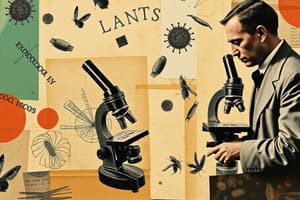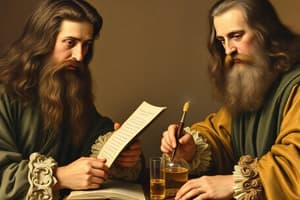Podcast
Questions and Answers
Who is known as the father of microbiology?
Who is known as the father of microbiology?
- Robert Koch
- Edward Jenner
- Louis Pasteur (correct)
- Robert Hooke
Which scientist is credited with the first and greatest success of immunization?
Which scientist is credited with the first and greatest success of immunization?
- Heinrich Anton de Bary
- Agostino Maria Bassi
- Joseph Lister
- Edward Jenner (correct)
Who pioneered the study of contagious diseases?
Who pioneered the study of contagious diseases?
- Agostino Maria Bassi (correct)
- Martin Willem Beijerinck
- Robert Koch
- Walter Reed
Which pioneer is associated with antisepsis?
Which pioneer is associated with antisepsis?
Which scientist discovered the malaria parasite?
Which scientist discovered the malaria parasite?
Which scientist is known for his contributions to the study of mycology?
Which scientist is known for his contributions to the study of mycology?
Which scientist is associated with the early studies on leprosy?
Which scientist is associated with the early studies on leprosy?
Who is recognized for his work in bacteriology during the 19th century?
Who is recognized for his work in bacteriology during the 19th century?
Which figure significantly advanced the understanding of immunology, particularly through the concept of phagocytosis?
Which figure significantly advanced the understanding of immunology, particularly through the concept of phagocytosis?
Which scientist focused on the prevention and treatment of yellow fever?
Which scientist focused on the prevention and treatment of yellow fever?
Flashcards are hidden until you start studying
Study Notes
Key Figures in Microbiology
- Robert Hooke (1635–1703): First to observe microorganisms, laying foundational principles for microbiology.
- Lazzaro Spallanzani (1729–1799): Conducted experiments that challenged spontaneous generation and emphasized the importance of sterilization.
- Edward Jenner (1749–1823): Developed the first successful smallpox vaccine; recognized as a pioneer in immunization practices.
- Agostino Maria Bassi (1773–1856): Conducted research that demonstrated the connection between microorganisms and contagious diseases, specifically silkworm disease.
- Ignaz Philipp Semmelweis (1818–1865): Advocated for hand hygiene in obstetrical clinics, significantly reducing maternal mortality rates.
- Louis Pasteur (1822–1895): Considered the father of microbiology; his work on fermentation and pasteurization advanced microbial science.
- Ferdinand Julius Cohn (1828–1898): Made significant contributions to the field of bacteriology and classified bacteria for the first time.
- Joseph Lister (1827–1912): Introduced antiseptic techniques in surgery, greatly minimizing post-surgical infections.
- Heinrich Anton de Bary (1831–1888): Pioneered mycology, studying fungi and their role in plant diseases.
- Thomas Jonathan Burrill (1839–1916): Researched microbes' involvement in plant diseases, contributing to agricultural science.
- Gerhard Henrik Armauer Hansen (1841–1912): Discovered the bacterium behind leprosy, leading to advancements in treatment.
- Robert Koch (1843–1910): Established Koch's postulates, which set the criteria for identifying the causative agents of infectious diseases.
- Élie Metchnikoff (1845–1916): Known for his work on phagocytosis, contributing immensely to immunology.
- Charles Louis Alphonse Laveran (1845–1922): Discovered the malaria parasite, enhancing understanding of tropical medicine.
- Martinus Willem Beijerinck (1851–1931): Recognized as a pioneer in general microbiology; studied viruses and the nitrogen cycle.
- Walter Reed (1851–1902): Key figure in identifying the transmission method of yellow fever, influencing public health policies.
Pioneers in Microbiology and Immunology
-
Robert Hooke (1635–1703):
- First to observe microorganisms, pioneering the field of microbiology.
-
Lazzaro Spallanzani (1729–1799):
- Conducted experiments against the spontaneous generation theory, enhancing understanding of microorganisms.
-
Edward Jenner (1749–1823):
- Developed the first successful smallpox vaccine, marking a landmark achievement in immunization.
-
Agostino Maria Bassi (1773–1856):
- Investigated the causes of infectious diseases, laying the groundwork for the germ theory.
-
Ignaz Philipp Semmelweis (1818–1865):
- Advocated for handwashing in hospitals to prevent puerperal fever, saving countless maternal lives.
-
Louis Pasteur (1822–1895):
- Known as the Father of Microbiology, he developed pasteurization and vaccines for rabies and anthrax.
-
Ferdinand Julius Cohn (1828–1898):
- Made significant contributions to bacteriology, classifying bacteria and studying their life cycles.
-
Joseph Lister (1827–1912):
- Revolutionized surgery by introducing antiseptic techniques, reducing post-operative infections.
-
Heinrich Anton de Bary (1831–1888):
- Considered the father of mycology; studied fungi and their role in disease.
-
Thomas Jonathan Burrill (1839–1916):
- Research focused on microbe-related plant diseases, contributing to plant pathology.
-
Gerhard Henrik Armauer Hansen (1841–1912):
- Identified the bacterium causing leprosy, advancing the understanding of contagious diseases.
-
Robert Koch (1843–1910):
- Established Koch's postulates, crucial for linking specific pathogens to diseases, and won a Nobel Prize in Physiology or Medicine.
-
Élie Metchnikoff (1845–1916):
- Pioneered the study of phagocytosis, demonstrating the immune response of organisms to infection.
-
Charles Louis Alphonse Laveran (1845–1922):
- Discovered the malaria parasite, enhancing the understanding of vector-borne diseases.
-
Martinus Willem Beijerinck (1851–1931):
- Established principles of microbiology and discovered viruses, particularly in plants.
-
Walter Reed (1851–1902):
- Known for his work on yellow fever, proving it was transmitted by mosquitoes, which led to significant public health advancements.
Studying That Suits You
Use AI to generate personalized quizzes and flashcards to suit your learning preferences.




